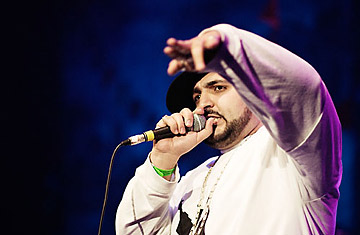
Eslam Jawaad has rapped against Syria's protests but says he doesn't "condone the handling of the situation by the government in any capacity"
The shaky snippet of video looks like it was inadvertently filmed, as if the amateur cameraman — in his haste to escape the intense gunfire crackling in the background — forgot to press pause and wound up recording his sandal-clad feet as he ran along the sidewalk. It's meant to look like one of the countless amateur videos streaming out of Syria from an antigovernment protest, capturing the state's violent crackdown. Except it is not.
Instead, this is the opening sequence in a music video by Syrian-Lebanese rapper Eslam Jawaad. The song, called "Dudd al-Nizam," or "Against the System," is also not what its title may at first imply. The system Jawaad, 34, rails against isn't the Baathist regime of Syrian President Bashar Assad, which has struggled to quell street protests since mid-March. It's the forces aligned against it. "You are Syrian/ Keep your head high," the deeply voiced lyrics declare. "The true men of the [anti-Israeli] resistance remain in the lion's den," they continue — a play on the fact that Assad means lion in Arabic.
While rap has provided the gritty sound track to popular uprisings roiling some of the Middle East's most entrenched dictatorships, in Syria it has largely supported the status quo. Jawaad's track (which was recorded a month into the unrest), and some half a dozen others including "Dudd al-Balad" ("Against the Country") by Murder Eyes, have all been against the protests, although not necessarily supportive of Assad's brutal attempts to suppress them. "I surely don't condone the handling of the situation by the government in any capacity," Jawaad told TIME in an e-mail interview from Dubai, where he recently relocated from London. "But I also see the bigger picture here."
That picture is one the Syrian government is keen to portray: that protesters who have taken to the streets week in and week out for the past three months, despite a death toll approaching 1,400, have either been duped or are active participants in a foreign conspiracy aimed at punishing Syria for its politics. Damascus has long declared itself the beating heart of pan-Arab nationalism, a lynchpin state in an anti-American, anti-Israeli "resistance axis" that includes the Lebanese militant group Hizballah, the Palestinian Hamas movement and Iran.
In the video for "Dudd al-Nizam," Jawaad — a burly, bald, bearded young man in Ali G sunglasses surrounded by Assad portraits and canary yellow Hizballah flags — addresses the protesters, bemoaning the bloodshed and warning of a "system" aligned against his country of birth. "Brothers of the soil, I swear you'll be pardoned/ But it's time you understand the game/ How much has been paid out; who sold their country, and to whom?" he chants rapidly. "This is their system, the new world order/ The system of the damned Zionists and crooks/ So, take note, I am against this system/ I want the fall of the conspiracy, I want security in the country/ I want reform, that's for sure; in a beneficial way, not chaotic/ So put your hand in mine; we'll walk together, we'll build together/ If destruction is the poison, then reforms are the remedy/ Focus on what is more important: let's smell the air of the [Israeli-occupied, Syrian] Golan, and by God's will, we'll meet in Jerusalem."
Jackson Allers, a Beirut-based writer and filmmaker who has been documenting the rise of Arab hip-hop on his blog BeatsandBreath.com and is writing a book on the subject, says Syria's antirevolutionary rap may be as much a reflection of a class divide as it is about a desire to preserve one of the last remaining secular pan-Arab socialist states. Although there have been small isolated protests in Syria's capital, Damascus, and in its largest city, Aleppo, the populations of these two key middle- to upper-class cities have yet to come out in force against the regime. Instead, the uprising has drawn its strength largely from the hinterlands, from rural, socially and more religiously conservative areas like the southern city of Dara'a, where protests first erupted. The hip-hop artists, Allers says, "don't relate to that. Why would they?"
There's still a whole swath of the Syrian population that is either undecided, or (especially in the case of some minorities like the Druze, Christians and the ruling Alawites) too frightened, or change-averse. It's this huge chunk — this loose middle — that will ultimately play a key role in deciding which way this crisis goes, if it chooses a side. It's unclear how large an audience Syrian rap has and may potentially sway, or at the very least, tap into. "It's very, very formative," Allers says of the scene. Although most of the Syrian political rap that has recently emerged has been pro-Assad, there are a few antiregime songs, like "Bayan Raqam Wahid" ("Statement No. 1"), which, tellingly, was released anonymously on the Internet. "You filled the country with intelligence agents/ Human rights are forbidden/ You don't know the difference between a nationalist and a traitor," says the unnamed male rapper.
Jawaad says that he and other "pro-stability" rappers are pro-Assad by choice, not because they are forced to be or fear the consequences if they are not. Still, these days, picking sides in the Arab Spring can be a risky proposition for a musician. Egypt's pop sensation Tamer Hosny, for example, who pledged his loyalty to Egyptian President Hosni Mubarak before he was ousted in February, has been all but blacklisted by his former fans. Jawaad says that he and other Syrian rappers spoke out for a reason, but he also seems to be hedging his bets. "If the regime did fall and Syria got better and the people benefited, I wouldn't be sad that I was wrong."
